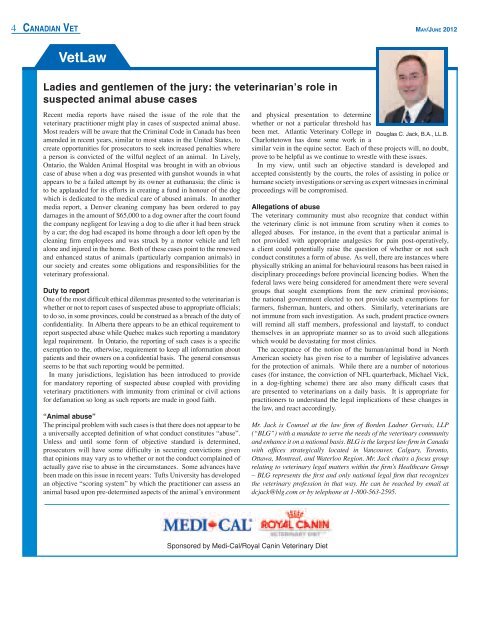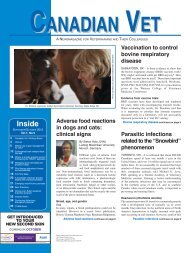canadian vet - K2 Animal Health Publishing
canadian vet - K2 Animal Health Publishing
canadian vet - K2 Animal Health Publishing
Create successful ePaper yourself
Turn your PDF publications into a flip-book with our unique Google optimized e-Paper software.
4 Canadian Vet<br />
May/June 2012<br />
VetLaw<br />
Ladies and gentlemen of the jury: the <strong>vet</strong>erinarian’s role in<br />
suspected animal abuse cases<br />
Recent media reports have raised the issue of the role that the<br />
<strong>vet</strong>erinary practitioner might play in cases of suspected animal abuse.<br />
Most readers will be aware that the Criminal Code in Canada has been<br />
amended in recent years, similar to most states in the United States, to<br />
create opportunities for prosecutors to seek increased penalties where<br />
a person is convicted of the wilful neglect of an animal. In Lively,<br />
Ontario, the Walden <strong>Animal</strong> Hospital was brought in with an obvious<br />
case of abuse when a dog was presented with gunshot wounds in what<br />
appears to be a failed attempt by its owner at euthanasia; the clinic is<br />
to be applauded for its efforts in creating a fund in honour of the dog<br />
which is dedicated to the medical care of abused animals. In another<br />
media report, a Denver cleaning company has been ordered to pay<br />
damages in the amount of $65,000 to a dog owner after the court found<br />
the company negligent for leaving a dog to die after it had been struck<br />
by a car; the dog had escaped its home through a door left open by the<br />
cleaning firm employees and was struck by a motor vehicle and left<br />
alone and injured in the home. Both of these cases point to the renewed<br />
and enhanced status of animals (particularly companion animals) in<br />
our society and creates some obligations and responsibilities for the<br />
<strong>vet</strong>erinary professional.<br />
Duty to report<br />
One of the most difficult ethical dilemmas presented to the <strong>vet</strong>erinarian is<br />
whether or not to report cases of suspected abuse to appropriate officials;<br />
to do so, in some provinces, could be construed as a breach of the duty of<br />
confidentiality. In Alberta there appears to be an ethical requirement to<br />
report suspected abuse while Quebec makes such reporting a mandatory<br />
legal requirement. In Ontario, the reporting of such cases is a specific<br />
exemption to the, otherwise, requirement to keep all information about<br />
patients and their owners on a confidential basis. The general consensus<br />
seems to be that such reporting would be permitted.<br />
In many jurisdictions, legislation has been introduced to provide<br />
for mandatory reporting of suspected abuse coupled with providing<br />
<strong>vet</strong>erinary practitioners with immunity from criminal or civil actions<br />
for defamation so long as such reports are made in good faith.<br />
“<strong>Animal</strong> abuse”<br />
The principal problem with such cases is that there does not appear to be<br />
a universally accepted definition of what conduct constitutes “abuse”.<br />
Unless and until some form of objective standard is determined,<br />
prosecutors will have some difficulty in securing convictions given<br />
that opinions may vary as to whether or not the conduct complained of<br />
actually gave rise to abuse in the circumstances. Some advances have<br />
been made on this issue in recent years: Tufts University has developed<br />
an objective “scoring system” by which the practitioner can assess an<br />
animal based upon pre-determined aspects of the animal’s environment<br />
and physical presentation to determine<br />
whether or not a particular threshold has<br />
been met. Atlantic Veterinary College in<br />
Charlottetown has done some work in a<br />
similar vein in the equine sector. Each of these projects will, no doubt,<br />
prove to be helpful as we continue to wrestle with these issues.<br />
In my view, until such an objective standard is developed and<br />
accepted consistently by the courts, the roles of assisting in police or<br />
humane society investigations or serving as expert witnesses in criminal<br />
proceedings will be compromised.<br />
Allegations of abuse<br />
The <strong>vet</strong>erinary community must also recognize that conduct within<br />
the <strong>vet</strong>erinary clinic is not immune from scrutiny when it comes to<br />
alleged abuses. For instance, in the event that a particular animal is<br />
not provided with appropriate analgesics for pain post-operatively,<br />
a client could potentially raise the question of whether or not such<br />
conduct constitutes a form of abuse. As well, there are instances where<br />
physically striking an animal for behavioural reasons has been raised in<br />
disciplinary proceedings before provincial licencing bodies. When the<br />
federal laws were being considered for amendment there were several<br />
groups that sought exemptions from the new criminal provisions;<br />
the national government elected to not provide such exemptions for<br />
farmers, fisherman, hunters, and others. Similarly, <strong>vet</strong>erinarians are<br />
not immune from such investigation. As such, prudent practice owners<br />
will remind all staff members, professional and laystaff, to conduct<br />
themselves in an appropriate manner so as to avoid such allegations<br />
which would be devastating for most clinics.<br />
The acceptance of the notion of the human/animal bond in North<br />
American society has given rise to a number of legislative advances<br />
for the protection of animals. While there are a number of notorious<br />
cases (for instance, the conviction of NFL quarterback, Michael Vick,<br />
in a dog-fighting scheme) there are also many difficult cases that<br />
are presented to <strong>vet</strong>erinarians on a daily basis. It is appropriate for<br />
practitioners to understand the legal implications of these changes in<br />
the law, and react accordingly.<br />
Mr. Jack is Counsel at the law firm of Borden Ladner Gervais, LLP<br />
(“BLG”) with a mandate to serve the needs of the <strong>vet</strong>erinary community<br />
and enhance it on a national basis. BLG is the largest law firm in Canada<br />
with offices strategically located in Vancouver, Calgary, Toronto,<br />
Ottawa, Montreal, and Waterloo Region. Mr. Jack chairs a focus group<br />
relating to <strong>vet</strong>erinary legal matters within the firm’s <strong>Health</strong>care Group<br />
– BLG represents the first and only national legal firm that recognizes<br />
the <strong>vet</strong>erinary profession in that way. He can be reached by email at<br />
dcjack@blg.com or by telephone at 1-800-563-2595.<br />
Sponsored by Medi-Cal/Royal Canin Veterinary Diet





